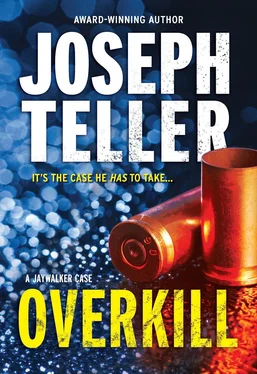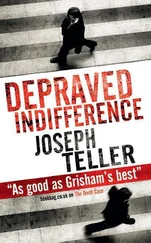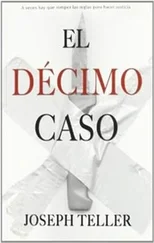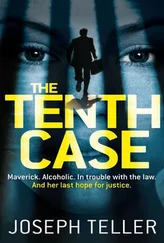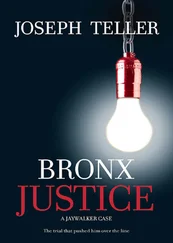Joseph Teller - Overkill
Здесь есть возможность читать онлайн «Joseph Teller - Overkill» — ознакомительный отрывок электронной книги совершенно бесплатно, а после прочтения отрывка купить полную версию. В некоторых случаях можно слушать аудио, скачать через торрент в формате fb2 и присутствует краткое содержание. Жанр: Криминальный детектив, на английском языке. Описание произведения, (предисловие) а так же отзывы посетителей доступны на портале библиотеки ЛибКат.
- Название:Overkill
- Автор:
- Жанр:
- Год:неизвестен
- ISBN:нет данных
- Рейтинг книги:3 / 5. Голосов: 1
-
Избранное:Добавить в избранное
- Отзывы:
-
Ваша оценка:
- 60
- 1
- 2
- 3
- 4
- 5
Overkill: краткое содержание, описание и аннотация
Предлагаем к чтению аннотацию, описание, краткое содержание или предисловие (зависит от того, что написал сам автор книги «Overkill»). Если вы не нашли необходимую информацию о книге — напишите в комментариях, мы постараемся отыскать её.
Overkill — читать онлайн ознакомительный отрывок
Ниже представлен текст книги, разбитый по страницам. Система сохранения места последней прочитанной страницы, позволяет с удобством читать онлайн бесплатно книгу «Overkill», без необходимости каждый раз заново искать на чём Вы остановились. Поставьте закладку, и сможете в любой момент перейти на страницу, на которой закончили чтение.
Интервал:
Закладка:
“But I’m Jeremy’s mother,” she protested.
“That’s the point,” he explained. “I plan on calling both of you as witnesses. I don’t want the D.A. to be able to say we discussed the facts of the case together.”
She grumbled, but she went.
Still, it was impossible. As Miranda and he sat there at the conference table, lawyers who had rooms in the suite kept popping in and out, going to and from the copy room, the secretaries’ area, the restrooms or the conference room itself, which doubled as a library and was lined with stacks of law books that on any other day did nothing but collect dust and serve as decoration. But on this particular day, it seemed they’d all become instant, must-read bestsellers.
Everyone wanted to get a look at Miranda.
Or better yet, two or three or four looks.
He finally found them an empty room and retreated to it, and they were able to speak for the better part of an hour. That was the good news. The bad news was that fifteen minutes into that hour, Jaywalker realized that Miranda wasn’t going to be able to help Jeremy.
It wasn’t that she didn’t want to; she did. But in the days following the shooting, the detectives had quickly identified her, located her and picked her up. They’d brought her to the precinct, whether voluntarily on her part or not. But legally, it made no difference. A criminal defendant gets to complain about violations of his rights, and if those violations are serious enough, evidence gathered as a result of them can be suppressed and kept out of his trial. But when the violations are of other people’s rights-Miranda’s, for example-the defendant lacks what lawyers call standing to object.
According to Miranda, the detectives had threatened to arrest her as an accomplice to murder and as an “accessory after the fact,” a layman’s term that doesn’t even appear in the pages of the Penal Law. But they’d succeeded in frightening her sufficiently to get her to write out and sign a statement. In it she’d said she didn’t know whether it had been Victor Quinones who’d first pulled the gun or Jeremy, even though she now assured Jaywalker it had been Victor. And she’d described the final shot the same way the other witnesses had, putting the gun in Jeremy’s hand as he stood over his fallen victim, who lay helplessly on the pavement, looking up and begging for mercy.
Miranda Raven was a poisoned witness.
That meant whichever side called her would suffer the consequences. When a lawyer puts a person on the stand, whether to testify as a fact witness, an expert or a character witness, the jury anticipates that that person is going to help the side that’s called him. Sure, there may be some inroads made on cross-examination, but the natural expectation is that on balance, the witness will end up helping the side that called him. After all, that was why he was called in the first place, to help.
If Jaywalker were to call Miranda, Katherine Darcy would have a field day attacking her with her signed statement. Even if Miranda were to disown it as the product of intimidation, her value to the defense would be so diminished that she’d end up hurting far more than helping. Conversely, if Katherine Darcy called her, no matter how many times she reminded Miranda of what she’d said in the statement, her repudiation of those things at trial would seriously undercut the prosecution’s chances. In other words, it mattered greatly which side chose to call Miranda, because in doing so, that side implicitly vouched for her credibility and stood to lose significantly in the eyes of the jury once she was neutralized on cross.
So it wasn’t just a matter of Miranda being a mixed bag, a witness who would both help and hurt each side at the same time. In immediately sizing her up as a poisoned witness, Jaywalker was grasping a more fundamental and critical truth about her: that whichever side made the mistake of touching her first would be the one infected, and the results could well prove fatal.
He didn’t tell her any of that, of course. To do so would have been nothing short of cruel. It would have been tantamount to saying, “You screwed up so badly by writing out and signing that statement that now you’re of no use to Jeremy, and as a result, he’s probably going to be convicted.” No, he couldn’t do that. All he could tell her was that they’d see how things played out, then ask her to keep in touch.
“Can I see Jeremy?” was all she wanted to know.
There was a part of Jaywalker that still wanted to say no. But as he thought about it, he realized that to do so would be to succumb to his anger at her. Why anger? Because she’d been so easily intimidated by the detectives. Because she’d been stupid enough to believe they could really charge her with a crime just for the accident of being present when one had been committed. He wanted to ask her how she possibly could have thought that and tell her how shallow her loyalty to Jeremy had been. He wanted to yell at her, to grab her by the shoulders and shake some sense into her. But it was too late for all that, he knew. All he would succeed in doing would be to make her cry.
So he said, “Sure. Sure, you can see Jeremy.” And even described the steps she’d have to go through in order to do it.
But it hurt. It hurt terribly. Of the four people who’d been in the immediate vicinity of the shooting, one was dead and another was severely compromised, first because he was the defendant, and second because he was so withdrawn and inarticulate. Now a third, whom Jaywalker had considered his greatest hope, had been rendered totally useless. That left only the fourth, Teresa Morales.
Teresa Morales was anything but disinterested. She’d not only been a member of the Raiders gang herself, she’d been Victor Quinones’s girlfriend. Yet the way the trial was suddenly shaping up, it was beginning to look as though she was going to have the definitive word as to what had happened.
Which was bad news indeed for Jeremy Estrada.
11
If you’ve been lucky enough to have spent any significant time driving across the lower forty-eight, or even watching it go by from the window of a train-and Jaywalker had done both in younger days-you’ve learned not to look for city skyscrapers before you’ve first passed through outlying towns and suburbs; that on your way to the banks of the mightiest of rivers you’ll first have to cross a series of creeks, brooks and streams; and that mountains almost invariably have foothills.
Trials have postponements.
Though, for some reason, lawyers prefer to think of them as adjournments. Perhaps the bias has something to do with the differing implications inherent in the words themselves. To postpone is to put off, to avoid for the present an unpleasant task or event. It carries a distinctly negative connotation. To adjourn, on the other hand, is an act of continuance, a forward-looking promise to reconvene and readdress the matter on another day. It somehow manages to suggest that progress is being made, that the journey goes on.
And just as the foothills grow taller as the mountain is approached, the density of homes increases as the city looms larger on the horizon, and the streams deepen and broaden as the river nears, so, too, do adjournments change. Their intervals become increasingly shorter. They take on new designations of purpose: “for discovery,” “for control purposes,” “for hearing,” and, finally, “for trial.” Warning labels begin popping up: “People to be ready,” “final versus defendant,” “no further adjournments,” “final versus both sides,” and eventually “date absolutely certain for trial.”
Jaywalker was more than just fluent in the language; he loved the journey itself. He’d learned long ago that every case had a built-in clock of its own, an inner circadian rhythm to guide it as it ripened and readied itself toward maturity. He knew that with rare exception prosecutors could rush cases to trial only so much, defense lawyers could dodge the day of reckoning only so long, and even judges-yes, even the Harold Wexlers of the system-were pretty much powerless to significantly speed things up or slow them down. To succeed in doing so would be tantamount to hastening the sunrise or holding back the tide.
Читать дальшеИнтервал:
Закладка:
Похожие книги на «Overkill»
Представляем Вашему вниманию похожие книги на «Overkill» списком для выбора. Мы отобрали схожую по названию и смыслу литературу в надежде предоставить читателям больше вариантов отыскать новые, интересные, ещё непрочитанные произведения.
Обсуждение, отзывы о книге «Overkill» и просто собственные мнения читателей. Оставьте ваши комментарии, напишите, что Вы думаете о произведении, его смысле или главных героях. Укажите что конкретно понравилось, а что нет, и почему Вы так считаете.
